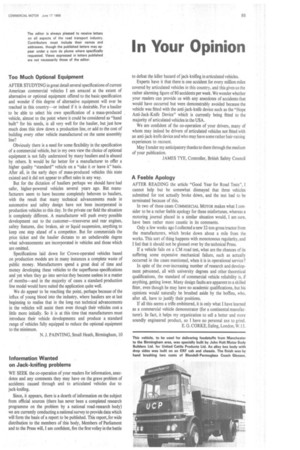In Your Opinion
Page 87

If you've noticed an error in this article please click here to report it so we can fix it.
Too Much Optional Equipment
AFTER STUDYING in great detail several specifications of current American commercial vehicles I am amazed at the extent of alternative or optional equipment offered to the basic specification and wonder if this degree of alternative equipment will ever be reached in this country—or indeed if it is desirable. For a haulier to be able to select his own specification of a mass-produced vehicle, almost to the point where it could be considered as "hand built" for his needs, is all very well for the haulier, but just how much does this slow down a production line, or add to the cost of building every other vehicle manufactured on the same assembly line?
Obviously there is a need for some flexibility in the specification of a commercial vehicle, but in my own view the choice of optional equipment is not fully understood by many hauliers and is abused by others. It would be far better for a manufacturer to offer a higher quality "standard" vehicle on a "take it or leave it" basis. After all, in the early days of mass-produced vehicles this state existed and it did not appear to affect sales in any way.
But for the dictation of hauliers perhaps we should have had safer, higher-powered vehicles several years ago. But manufacturers seem to have become completely behoven to hauliers, with the result that many technical advancements made in automotive and safety design have not been incorporated in production vehicles to this day. In the private car field the situation is completely different. A manufacturer will push every possible development out to the customer—transverse and rear engines, safety features, disc brakes, air or liquid suspension, anything to keep one step ahead of a competitor. But for commercials the price ticket and the haulier dictates to an unbelievable degree what advancements are incorporated in vehicles and those which are omitted.
Specifications laid down for Crown-operated vehicles based on production models are in many instances a complete waste of public money. Manufacturers spend a great deal of time and money developing these vehicles to the superfluous specifications and yet when they go into service they become useless in a matter of months—and in the majority of cases a standard production line model would have suited the application quite well.
We do appear to be reaching the point, perhaps because of the influx of young blood into the industry, where hauliers are at last beginning to realise that in the long run technical advancements in the vehicles will assist them even though their vehicles cost a little more initially. So it is at this time that manufacturers must introduce their vehicle developments and produce a standard range of vehicles fully equipped to reduce the optional equipment to the minimum.
N. J. PAINTING, Small Heath, Birmingham, 10




















































































































































